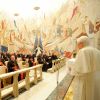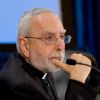Pope Benedict's visit can bring new hope to Middle East
As war bears down from all sides, Lebanese Christians are waiting for their own Arab Spring. For the Middle East’s most Christian country, spring arrives with Pope Benedict’s visit to Beirut Sept. 14-16.
“The Pope’s visit comes as an important message of peace, not only for the Christians but also for the Muslims of the region,” Issam Bishara, Catholic Near East Welfare Association regional director, told The Catholic Register in an e-mail from Beirut.
With much larger Syria fully engulfed in civil and sectarian war to the north, east and south, fighting has already slipped across the border into Lebanon.
“Lebanon cannot but be affected by what is going on in Syria,” Bishara said.
Despite the raging war in Syria, Lebanese and Vatican officials expect the papal visit to proceed on schedule.
“I know that the visit is very well prepared and the security is under the control of the presidential guard,” said Bishara.
In Beirut on Sept. 15, Pope Benedict XVI will deliver an exhortation based on the 2010 Synod on the Middle East in Rome. The synod gathered bishops and patriarchs of the region with selected bishops from around the world to discuss the future of Christianity in the land of its birth. With a diminishing Christian population, deep divisions along religious lines and the increasing dominance of politicized forms of Islam, the bishops called for an enlarged secularism with room for all religious voices and institutions to contribute to society. Such a transformation has to begin with ideals of citizenship which transcend local allegiances of tribe, clan and family, said the bishops.
Keeping Lebanon at peace is critical for the future of the whole region, said Fr. Youssef Chedid, associate pastor at Toronto’s Our Lady of Lebanon parish.
“Lebanon is a key country in the (Middle) East in which everything that happens in Lebanon will have implications for the whole area, and vice versa,” he said.
Chedid was an expert advisor at the 2010 Synod on the Middle East. He views the Pope’s Sept. 15 exhortation as an opportunity to re-orient the Arab Spring.
“It’s more an autumn than a spring (so far),” said Chedid. “It hasn’t brought good news. It hasn’t brought events of social progress. It didn’t get better after all these revolutions.”
Pope Benedict XVI’s exhortation is an opportunity to change the channel on entrenched regional conflicts, said Chedid.
“We would hope that this exhortation will bring to the whole Middle East a new hope,” he said.
A form of secularism that respects and values the contributions of all religions, where majorities and minorities can speak as equals, is the best hope for Middle Eastern Christians, said Chedid.
“We don’t want to be considered second rate. We don’t want to live in a totalitarian regime. We want democracy that will care for all the social groups,” he said.
Chedid grew up in Lebanon under the rule of the militias. He worries that importing a war from Syria repeats the same mistake of Lebanon in the 1980s.
“It’s the war of outside parties with everyone supporting outside parties,” he said. “They’re doing their fight on our land.”
Countering the tendency for regional wars to seep into Lebanon, the Pope has the opportunity to export a vision of peace from Lebanon to the region, according to Chedid.
“Our hope after the visit of the Pope to Lebanon is that through Lebanon he will speak to all the Arab countries and he will help us to understand each other — to help us to have a good dialogue, not between the strong party and the weak party but between all of us as believers. We will have a dialogue that will care about everything on the social level and also the political level.”
This message matters when gun battles break out between Sunni and Alawite militants across Syria Street in Tripoli, Lebanon’s second largest city, said Bishara. The Alawites are loyal to the Assad family and its regime in Damascus. As in Syria, the Sunnis line up with rebel forces.
It isn’t just Lebanon’s Muslims who are picking sides in Syria’s war.
“Christians in Lebanon have already chosen sides. One group supports General (Michel) Aoun (founder of the Free Lebanon Party) whose allies are the Shiite Hezbollah and Speaker of the House Nabih Berri,” said Bishara. “Another Christian group is loyal to the chief of the Lebanese Forces Samir Geagea, supported by the Sunnite political leaders headed by the previous Prime Minister Saad Al-Hariri.”
Aoun’s group is part of the March 8 Movement allied with Syria. Hariri is leader of the March 14 Alliance which opposes Syrian interference in Lebanon.
“The Church leadership in Lebanon, especially Maronite Patriarch Bechara Boutros al-Rahi, has been trying to unify this schism for years — but with very little success,” said Bishara.
So far, all parties want to avoid the kind of militia-led politics that made Lebanon a failed state in the 1980s.
“Going back to the years of war when militias were in charge of Lebanon is very unlikely,” said Bishara. “The leadership of the different political groups have all experienced the devastation resulting from total loss of order by government and also know well that in the end they will all lose.”
Al-Rahi condemned the “so-called military councils of clans and sects” as fighting broke out in Tripoli. Al-Rahi is calling on Lebanon’s central government to exercise full control and maintain its independence.
TORONTO - Every reporter wants what Martin Himel has — a story that could shift how people think and talk about global politics, a story rich with human drama, suffering, heartbreak and redemption.
Himel found that story among Christian refugees in Toronto and among the huddled and fearful Christians of Cairo and Baghdad where he filmed Persecuted Christians. The hour-long documentary will get its world premiere on VisionTV March 14.
VATICAN CITY - Pope Benedict XVI urged Christians in the Middle East not to lose hope despite the serious difficulties they face.
"I extend my prayerful thoughts to the regions in the Middle East, encouraging all the priests and faithful to persevere with hope through the serious suffering that afflicts these beloved people," he said.
The Pope made his remarks when he greeted Armenian Patriarch Nerses Bedros XIX Tarmouni of Beirut and Armenian bishops from around the world attending their synod in Rome.
Bishops see hope, fear, complexities in visit to Mideast Christians
JERUSALEM - Almost a year after the eruption of the Arab Spring uprisings, the Middle East is a place of hope and fear for Christians, said Bishop Gerald F. Kicanas of Tucson, Ariz.
Bishop Kicanas, chairman of the board of the U.S. bishops' Catholic Relief Services, was in Baghdad late last year and visited Egypt prior to his arrival in Jerusalem Jan. 8-12 for the annual Holy Land Coordination meeting with bishops from the United States, Canada and Europe.
"There is a fear among the Christians (in Egypt) whether they will be given human rights and whether they will be treated as equal citizens. There is a sense of wait and see," Bishop Kicanas told Catholic News Service Jan. 11.





